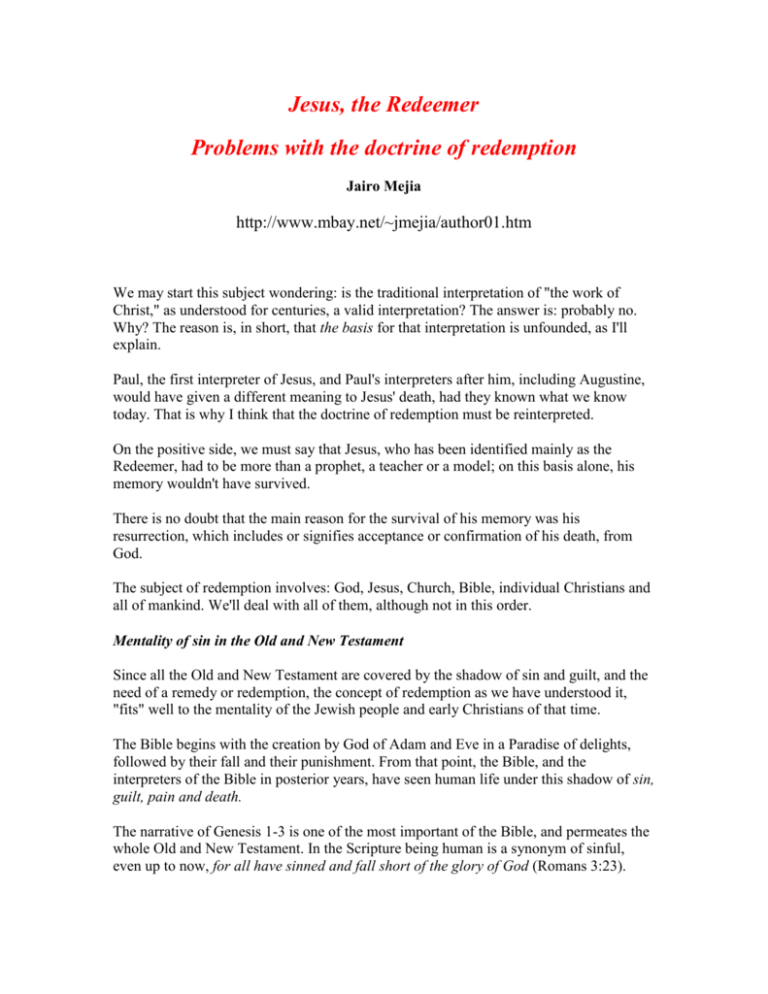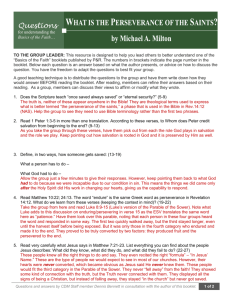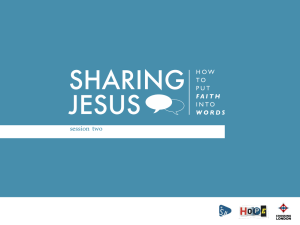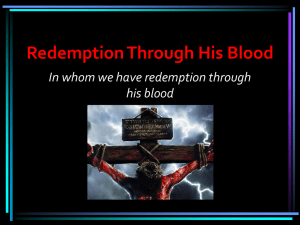Problems with the Doctrine of Redemption
advertisement

Jesus, the Redeemer Problems with the doctrine of redemption Jairo Mejia http://www.mbay.net/~jmejia/author01.htm We may start this subject wondering: is the traditional interpretation of "the work of Christ," as understood for centuries, a valid interpretation? The answer is: probably no. Why? The reason is, in short, that the basis for that interpretation is unfounded, as I'll explain. Paul, the first interpreter of Jesus, and Paul's interpreters after him, including Augustine, would have given a different meaning to Jesus' death, had they known what we know today. That is why I think that the doctrine of redemption must be reinterpreted. On the positive side, we must say that Jesus, who has been identified mainly as the Redeemer, had to be more than a prophet, a teacher or a model; on this basis alone, his memory wouldn't have survived. There is no doubt that the main reason for the survival of his memory was his resurrection, which includes or signifies acceptance or confirmation of his death, from God. The subject of redemption involves: God, Jesus, Church, Bible, individual Christians and all of mankind. We'll deal with all of them, although not in this order. Mentality of sin in the Old and New Testament Since all the Old and New Testament are covered by the shadow of sin and guilt, and the need of a remedy or redemption, the concept of redemption as we have understood it, "fits" well to the mentality of the Jewish people and early Christians of that time. The Bible begins with the creation by God of Adam and Eve in a Paradise of delights, followed by their fall and their punishment. From that point, the Bible, and the interpreters of the Bible in posterior years, have seen human life under this shadow of sin, guilt, pain and death. The narrative of Genesis 1-3 is one of the most important of the Bible, and permeates the whole Old and New Testament. In the Scripture being human is a synonym of sinful, even up to now, for all have sinned and fall short of the glory of God (Romans 3:23). The remedies Within this mentality, the need of a redeemer is understandable; and because of that, the history of salvation has been told in terms of the myth of Adam, and the remedies for this "tragedy" have been established. In the Old Testament, a bloody sacrificial system was instituted, and in the New Testament, the death of Jesus substituted the old sacrifices. In both cases the need of blood and of a redeemer was crucial: Without shedding of blood there is no remission (Hebrews 9:22; Leviticus 17:11). This concept of a bloody redemption in Christ was based on that Jewish mentality and their rituals of bloody sacrifices. With the same mentality the new Christians interpreted the role of Jesus, the meaning of his coming, of his life and of his death. Thus the image of Jesus was linked to the guilt of the human race, and the need of a rescue. Mark uses once the word "ransom" in his gospel (10:45), and Paul, interpreting Jesus, put him as the remedy of Adam's fall and human guilt and death: For as in Adam all die, even so in Christ all shall be made alive (1 Corinthians 15:22). Mark was Paul's companion; so, it is probable that he took the word "ransom" from his preaching. In the rest of the New Testament, Jesus' death at Passover was viewed as a sacrificial death, in the line of the Jewish mentality. The basis for this redemptive approach is unfounded In the fourth century Augustine (354-430) took all this mentality of the Bible and of the early Christian tradition, and elaborated the doctrine of original sin. All posterior theology up to Trent (1545-1563) was based on Augustine's interpretation. According to this doctrine, human nature is corrupt; moreover, at the time of Reformation it was affirmed -using theological and philosophical terms, - that human nature was ontologically corrupt. This would mean that the human race was essentially damaged by Adam's fall. Under those terms the need for redemption is clear. A doctrine about original sin included: Adam's sin is transmitted to every human being this "sin" is "contracted" not "committed" this sin is transmitted at birth the devil has acquired a certain domination over man man is a captive under the power of the devil Consequences of this sin, were: human ignorance and suffering inclination to sin called "concupiscence" moreover, death The role of Jesus he suffered the consequences of this sin he died for our sins in accordance with the scriptures (1 Corinthians 15:3) for our sake God made him to be sin (2 Corinthians 5:21) he bore our sins in his own body on the tree; and by whose stripes we were healed (1 Peter 2:24) But what neither Augustine nor Paul knew at their time was, that the existence of Adam and his fall were a myth or legend, not a fact on which to base their interpretations. Thus, the problem that we confront here is this: if the premises for this redemptive approach are untrue, then the conclusions are also untrue. This compelling evidence has obligated theologians to change the doctrine regarding original sin. Some say now that it was not Adam but the human race which fell. They want to maintain a doctrine of original sin!... The facts are not there; and death is not the consequence of a sin, but a biological fact of nature. Men have died since the homo sapiens appeared on earth, 500 million years before Adam was "created," and not as a consequence of the "fall," as the traditional doctrine of the original sin says. Application of the fruits of redemption There also has to be a theory explaining the application of the fruits of redemption. According to Peter at Pentecost it was just conversion. First, Jews to be baptized did that as a sign of converting to right living, to integrity. None of the early Christians were aware of the "original sin." This was a later interpretation. Church organization The church in its turn has created its own system for the application of redemption. Number one, it has proclaimed that Christ entrusted her to continue this redemptive mission. Still the consciousness of guilt is alive and so is the need for a remedy. Here the sacraments come: baptism, confession and the sacrifice Mass, all to remove sin. The church is here to rescue humanity. The role of the Father and salvation outside Christianity Let's think now about God and ask ourselves: What is his plan with mankind? This plan must have been in effect for about 500 thousand years, since "homo sapiens" has been on earth. Does he want to save a few, the "elected," or the whole of mankind? This is a serious question. The whole doctrine of redemption is very selective and discriminatory. The New Testament is a book about redemption and salvation for believers in Christ, only. How does this doctrine apply to the people who lived 100-500 thousand years ago? How does it apply to the billions of men and women, today, that do not know anything about Jesus, the cross, the church, the sacraments? What about those who worship God in other religions: Is there another way of salvation for them? This is precisely what we must find: a salvation for all! This important issue has been overlooked very often. We must have a doctrine of salvation, or redemption, for the whole of humanity, not just for Christians. God is the Creator of all human beings, loves all his creatures, and he is the final aim of all of them. How are they going to be saved? The immense love of God We must apply the full impact of the immense love of God for all his creatures, to his plan of salvation, and not have a narrow, discriminatory doctrine that does not include all mankind. Because the Father desires all men to be saved (1 Timothy 2:4). Until we have a satisfactory answer to this problem, we must question the traditional doctrine of redemption. Now, let’s be realistic. If the infinite love and mercy of God wants to give eternal life to perishable creatures, as we human beings are, he doesn’t need the sacrifice of a human being. Although, if he decided to do it that way, the death of his Son would be a dramatic mode of showing us his love. http://www.mbay.net/~jmejia/author01.htm







